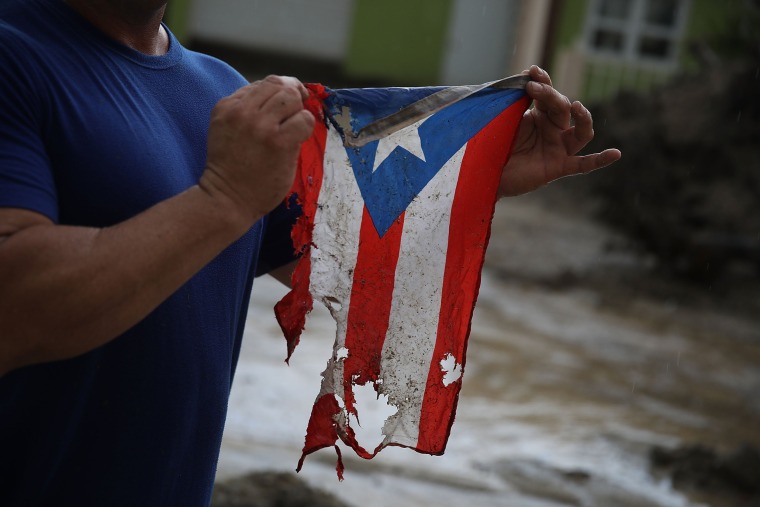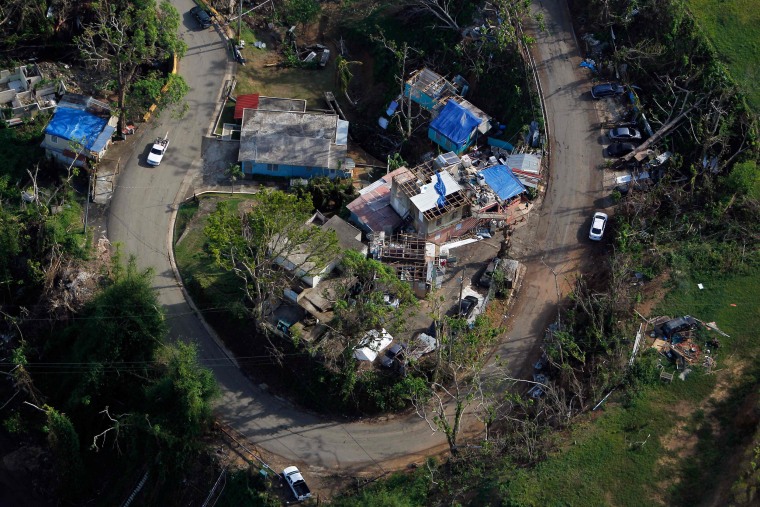Charlie Fonseca, an aviation engineer in Miami, spent a week without knowing if his mother, sister and nieces were OK after Hurricane Maria devastated his native Puerto Rico last year. He found himself glued to the television, feeling helpless.
“I was really anxious. I wanted to do so many things,” said Fonseca. “I couldn’t go there, and I was getting so frustrated.”
What effect did the worst hurricane in over a century have on Puerto Ricans like Fonseca who have lived in the U.S. mainland for many years?
It turns out Hurricane Maria did have a strong effect on them, but it also led to a renewed sense of identity, according to a new study.
“Connection to the island may put [Florida] Puerto Ricans at both an advantage and a disadvantage in terms of their secondary trauma to the storm,” wrote Cristalís Capielo, an assistant professor of counseling and counseling psychology at Arizona State University. Her study, “The day no one spoke: Florida Puerto Ricans' reaction to Hurricane María,” was recently published in The Counseling Psychologist.
Capielo said the study is the first to explore the psychological reactions of Puerto Ricans with secondary exposure to Hurricane María, which struck in September 2017. She focused on Florida because it's home to the largest boricua community on the mainland and because its geographical proximity makes the population more vulnerable to the effects of events on the island. In fact, after the storm, tens of thousands of Puerto Rican families left the island to seek shelter and refuge in Florida.
Capielo and her research team used focus groups of Florida-based Puerto Ricans as their main source of data collection and observed a set of emerging themes.
Most of the respondents spoke of seeing the impact of the storm in the media and becoming frustrated and saddened by the lack of resources available to islanders. They also expressed concern about loved ones they couldn't reach, especially in the immediate aftermath of the storm, and they perceived that the U.S. government wasn’t helping with relief efforts.
On the other hand, mainland Puerto Ricans also experienced post-traumatic vicarious growth, defined as “the positive outcomes that emerge from otherwise negative experiences.”
Mainland Puerto Ricans felt strengthened by the support they provided and received and by the belief that Puerto Ricans are resilient and strong-minded.
For them, the storm strengthened their cultural pride and made them more determined to help and serve the island.
Puerto Ricans 'are family'
After a week without news, Fonseca was able to hear from a friend that his mother, sister and nieces were OK. Yet he still felt the need to help out in any way he could, so he joined a group of veteran volunteers.
He remembers seeing groups scattered all over Florida — at churches, in parking lots, in malls.
“There were containers for donations everywhere,” he said.
To Fonseca, the mobilization among Florida Puerto Ricans underscored his belief that “Puerto Ricans, even those who haven’t met, are family.”
Though he had left the island for economic reasons, it will always be home, he said.
Natascha Otero-Santiago, founder of Parranda Puerto Rico, an organization dedicated to uniting the Puerto Rican diaspora on the mainland, said that before María there was a mentality that those who stayed on the island were different, even better, than those who had left.
After María, “Puerto Rico has realized that any decision that’s made about the island is made over here,” said Otero-Santiago, who lives in Miami. “And so it became a different push, more political."
"Whereas before there was a smaller trickling effect, now there was a search for every pocket of Puerto Ricans that exist to work together," said Otero-Santiago. "We realized we needed to be a strong 5.4 million here to help the 3.4 million there.”
Otero-Santiago, who grew up in San Juan but left the island to attend college in Boston, said organizing relief efforts was a way to cope with the storm.
“Hurricane Maria hadn’t even passed before the first donation center in Miami was created," she said.
She remembers a woman at a Florida donation center crying; she hadn't heard from her family in the island. Armed with a bag of grocery donations, she said she was ‘there to get her mind off of things.’

“A lot of us were in the same boat,” Otero-Santiago said.
In a phone interview with NBC News, Capielo said that because the results show that Florida Puerto Ricans were indirectly affected by Hurricane María, it’s “important for practitioners to evaluate potential distress associated with natural disasters affecting the island.”
She suggests that because Florida Puerto Ricans gained a renewed sense of cultural identity after the storm, they may benefit from treatment that “emphasizes Puerto Rican cultural heritage and identity.” She also proposes that Puerto Ricans who experienced secondary stress from the storm may benefit from community advocacy work, as many found volunteering and championing their community helped them cope.
Above all, psychological work with mainland Puerto Ricans must put the island's historical roots and sociopolitical status in context.
“The psychological consequences of traumatic events, whether negative or positive, are not contained by geographical boundaries,” said Capielo, who grew up on the island.
Fellow Puerto Ricans agree — especially since many of them often return to the island for frequent visits if money and time allow. One of them is Francisco Cerezo, an attorney who has been based in Miami for the last 18 years and feels like he “never really left” Puerto Rico.
After Hurricane María, Cerezo became a founding member of PRxPR, an organization he describes as “true believers who make things happen on a grassroots level.”
Over a year after the storm, "there is still a lot of need,” according to Cerezo. But if there is one "semi-silver lining," it's that people have united to help.
“The diaspora always had many different kinds of divisions,” Cerezo said. “There are all kinds of ways Puerto Ricans self-identified. But after María, the walls of self-identification came down. We rallied for each other and will continue to do so.”
FOLLOW NBC LATINO ON FACEBOOK, TWITTER AND INSTAGRAM.



